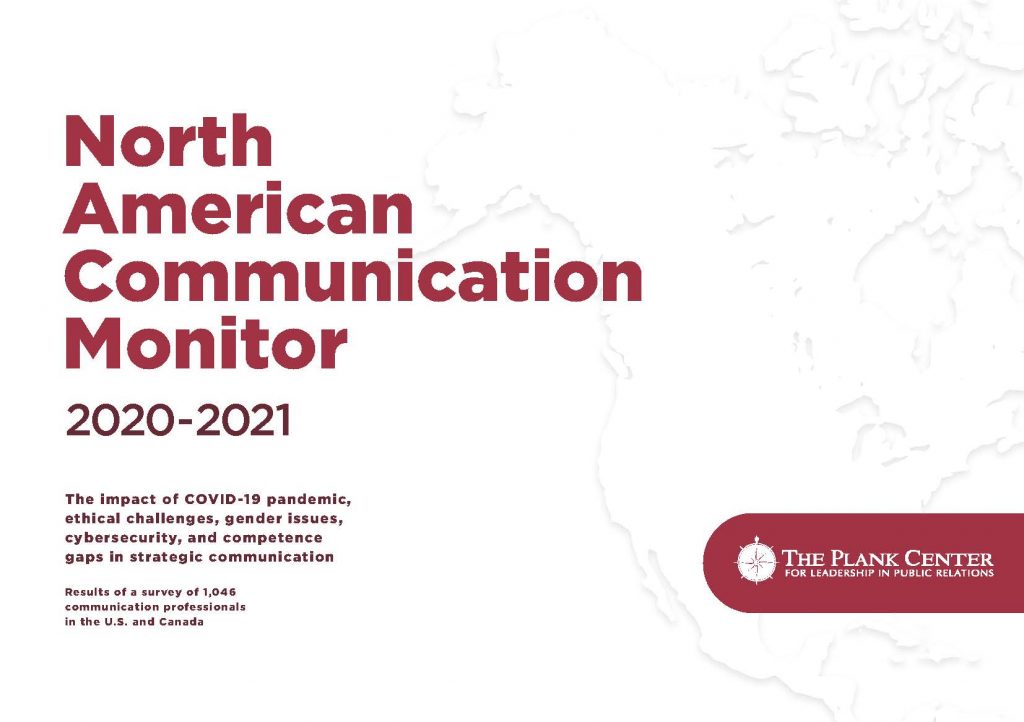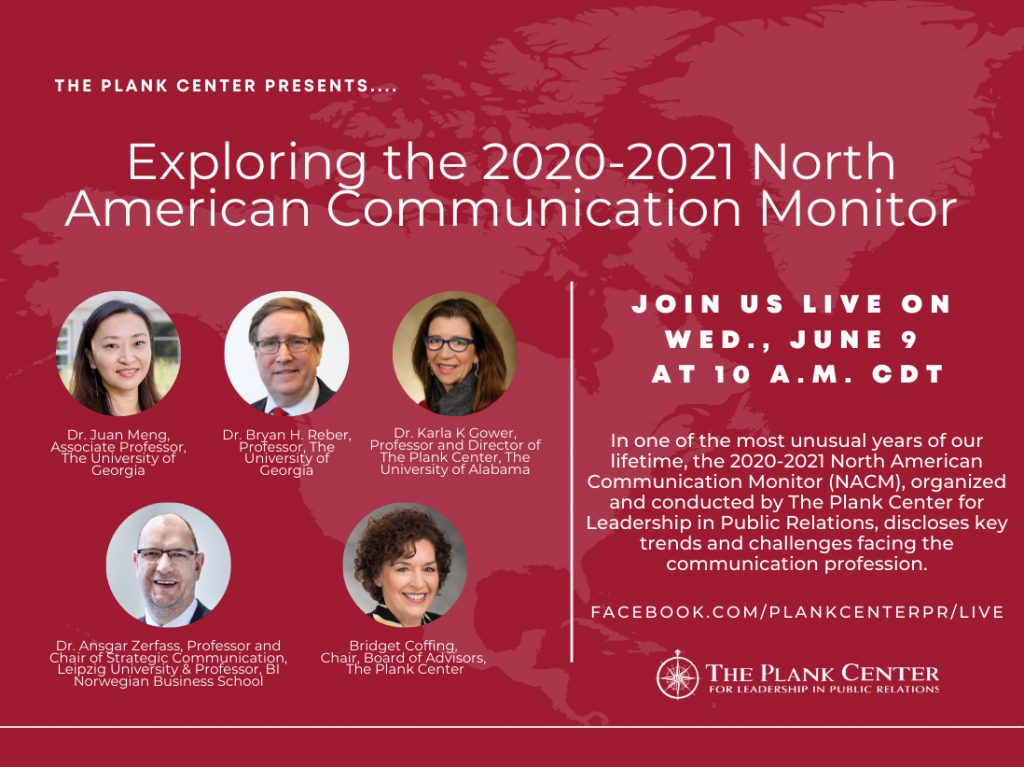June 3, 2021
In one of the most unusual years of our lifetime, the 2020-2021 North American Communication Monitor (NACM), organized and conducted by The Plank Center for Leadership in Public Relations, disclosed key trends and challenges facing the communication profession.

Some highlights include:
- Seven out of 10 professionals were satisfied with their organization’s communication and management during the COVID-19 pandemic, although the satisfaction level significantly decreased as the scope of the leadership responsibility decreases.
- Professionals in the U.S. were significantly more likely than their Canadian counterparts to report ethical challenges, and most ethical concerns are related to social media strategies.
- More than half of professionals confirmed their organization had been a victim of cyberattack or data theft.
- Nearly half (49.5%) of surveyed women acknowledged the impact of the glass ceiling in leadership advancement.
- While building and maintaining trust remains as the top strategic issue for the communication profession, tackling diversity, equity and inclusion (DEI) presents a pressing need.
- Professionals recognize the need to improve competencies, especially in data, technology, and management.
The results are based on responses from 1,046 communication professionals working in different types of organizations (25.6% in Canada and 74.4% in the United States). The sample achieved a fairly balanced gender split (47.7% men and 52.1% women) for accurate comparisons. The average age of participants was 41.2 years.
Bridget Coffing, chair of The Plank Center Board of Advisors, said, “In these unprecedented times and amid a rapidly changing landscape, the global pandemic accelerated trends around ethics, cyber security, and gender and racial inequality. The NACM provides insights into how those trends impacted communication professionals and brought into focus the skill set required to advance authentic, transparent messaging in an age of misinformation.”
This newest edition of NACM, which joins existing Communication Monitors in Europe, Latin America and Asia-Pacific, explored diverse topics, including COVID-19 and communication professionals’ responses, ethical challenges and resources for communication professionals, cybersecurity and communications, gender equality in the profession, strategic issues and communication channels, competency development, salaries, and characteristics of excellent communication departments.
Dr. Juan Meng, associate professor of public relations at The University of Georgia, and lead researcher of the NACM, said: “One of the leading trends revealed by this edition of NACM confirms that change is constant and inevitable. The combined impacts of the pandemic and the digital transformation of communications during times of social and racial unrest call for a strong leadership more than ever to hold your communication accountable while developing new ways of value creation. This edition of NACM offers data-driven insights to explain the difficulties communicators faced, the lessons learned, what core competencies are here to stay, and what new skills need to be acquired and reflected upon.”
Most professionals acknowledged COVID-19 is a heavily discussed topic.
Overall, clear evidence is found that the COVID-19 pandemic is a heavily discussed topic (83.2%). Professionals also confirmed that the impact of the pandemic on their daily work is significant (65.8%) but much higher for professionals in Canada (70.9%).Seven of 10 respondents felt their organizations did a satisfactory job managing changes associated with the pandemic.
Gender comparisons revealed a significant gap. Women perceived the pandemic as a heavily discussed topic, but men reported a significantly higher level of impact on their daily work (70.0% vs. 62.3%). Professionals working in public companies reported a significantly higher level of direct impact. Results also showed a significant correlation between leadership position and perceived direct impact. For example, top communication leaders reported the highest impact of the pandemic on their daily work.
Six out of 10 communication professionals in North America encountered one or more ethical challenges in the past year.
Communicators face ethical challenges in their day-to-day work. Professionals in the U.S. were significantly more likely than their Canadian counterparts to report ethical challenges. When dealing with ethical challenges, most professionals relied on the ethical guidelines of their organization. At the same time, the code of ethics of professional associations and their personal values and beliefs were also important resources.
Ethical concerns related to social media strategies are particularly relevant. Professionals were most concerned about the use of bots to generate feedback and followers on social media. They were also concerned about paying social media influencers for favorable mentions. In addition, professionals working in public companies were more concerned about profiling and targeting audiences based on big data analyses.
More than half of professionals confirmed their organization was a victim of cyberattack or data theft.
The reliance on the internet and digital communication has made cybersecurity a more prominent issue in practice. Six in 10 respondents confirmed cybersecurity is relevant to their daily work. Nearly one in five experienced multiple cyberattacks. Results showed cyber criminals are attacking governmental organizations (64.0%) and public companies (62.3%) more frequently.
Cyberattacks can take different formats, and the two most common ones are hacking websites and/or social media accounts (39.0%) and leaking sensitive information (37.5%). When engaging communication strategies in fighting cyber criminality, professionals actively worked on building resilience by educating their fellow employees (45.7%), developing cybersecurity guidelines (40.1%), and implementing cybersecurity technologies (42.7%).
Nearly half (49.5%) of surveyed women recognized the impact of the glass ceiling on their leadership advancement.
Almost seven out of 10 professionals (65.5%) observed an improvement in gender equality in their country. However, only half of them (45.6%) believed enough efforts have been made to advance gender equality. Specifically, disagreement arises when comparing perceptions by men (58.1%) and women (34.3%). Consistently, professionals acknowledged the issue of glass ceiling affecting women’s leadership advancement at all three levels: the communication profession (59.0%), the communication department and agency (46.0%), and the individual female practitioners (48.4%). In addition, public companies (62.8%) and nonprofits (63.9%) are criticized for their passive action to advance gender equality.
Approximately half of surveyed women stated they are personally affected by the glass ceiling in leadership advancement (49.5%). Reasons contributing to the glass ceiling problem are multifaceted, and the top two are linked to organizational barriers: lack of flexibility for family obligations (66.2%) and nontransparent, informal promotion policies (65.2%).
While building and maintaining trust remains as the top strategic issue, tackling DEI presents a pressing need for the communication profession.
When ranking the top strategic issues between now and 2023, professionals’ top-3 choices are:
- Building and maintaining trust (34.5%),
- Exploring new means of content creation and distribution (34.4%), and
- Tackling issues related to DEI (34.1%).
As for who is most capable of solving DEI issues, just more than half of respondents believed that organizational leaders carry the biggest responsibility (51.1%). However, only 39.9% of top communication leaders agreed with this selection. Instead, they shift such responsibility to the communication professionals themselves (42.4%).
More than half of communicators of all ages noted a “much or great need” to develop competencies.
The year 2020 taught communicators a variety of lessons including the value of maintaining a flexible skillset. More than half of communicators of all ages noted a “much or great need” to develop competencies. However, about 10% of the youngest respondents (29 years and younger) said there is no or little need for such development.
When assessing the importance and the personal qualification of six core competencies (data, technology, management, business, self-reflection and communication), large gaps were confirmed in data (-15.7%), technology (-12.4%) and management (-10.4%). Professionals working in governmental organizations and nonprofits rated their business, technology and data competencies significantly lower, as did female professionals.
“The NACM provides a substantive look at the issues that affect public relations leaders across the continent,” said Dr. Bryan Reber, C. Richard Yarbrough Professor in Crisis Communication Leadership at The University of Georgia and research chair at The Plank Center, “Communication became a freshly appreciated discipline in board rooms as the need for internal and external communication expertise exploded. We learned that senior management is very involved in day-to-day tactics during a crisis like the COVID-19 pandemic. We learned that gender-based pay equity still has to be addressed. And we learned that cybersecurity is a communication issue, not just an IT headache. The survey shines a light on so many areas of importance in our practice.”
To download and read the NACM 2020-2021 full report, please visit The Plank Center’s website.
###
About North American Communication Monitor 2020-2021
The North American Communication Monitor (NACM) is a biennial study organized and sponsored by The Plank Center for Leadership in Public Relations. The NACM is part of the Global Communication Monitor series. As the largest regular global study in the field of public relations and strategic communication, the Global Communication Monitor series aims at stimulating and promoting the knowledge and practice of strategic communication and communication management globally. The series covers more than 80 countries with similar surveys conducted in Asia-Pacific, Europe and Latin America.
About The Plank Center for Leadership in Public Relations
The Plank Center for Leadership in Public Relations is the leading international resource working to support students, educators and practitioners who are passionate about the public relations profession by developing and recognizing outstanding diverse public relations leaders, role models and mentors. Founded in 2005, the Center is named in honor of Betsy Plank, the “First Lady” of PR. Betsy’s legacy and vision continues on in the Center’s programs and initiatives to advance the profession and public relations education. For more information, please visit www.plankcenter.ua.edu.
Study Report
Results of the NACM 2020-2021 is published as a PDF report and can be downloaded here:
Meng, J. Reber, B. H., Berger, B. K., Gower, K. K., & Zerfass, A. (2021). North American Communication Monitor 2020-2021. The impact of COVID-19 pandemic, ethical challenges, gender issues, cyber security, and competence gaps in strategic communication. Tuscaloosa, AL: The Plank Center for Leadership in Public Relations.
ISBN (electronic): 978-0-578-90837-3
For more information about the Global Communication Monitor series, please visit http://www.globalcommunicationmonitor.com/.
Tune in to our Facebook Live discussion on Wednesday, June 9, 2021 at 10 a.m. CDT
